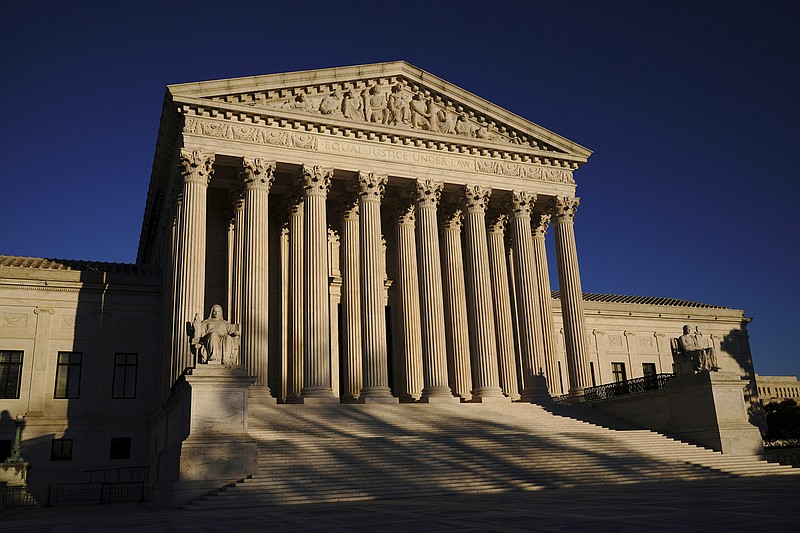The Supreme Court will hear oral arguments over the constitutionality of the Affordable Care Act on Tuesday in the midst of open enrollment, which kicked off Nov. 1 and runs through Dec. 15 for Tennesseans.
The case before the court, California v. Texas, began when Texas and a group of 17 other states - including Tennessee, Georgia and Alabama - sued the federal government in an attempt to strike down the health care law in 2018. A group of 21 other states, led by California, are seeking to defend the Affordable Care Act, often called the ACA or Obamacare.
Those wishing to do away with the ACA argue that when the tax penalty for not having health insurance - often called the individual mandate - was eliminated in 2017, it made the rest of the law unconstitutional. The court will determine whether the law can stand after parts are removed.
"Congress meant for the individual mandate to be the centerpiece of Obamacare," Texas Attorney General Ken Paxton said in his argument for the court. "Without the constitutional justification for the centerpiece, the law must go down."
If the law is struck down in its entirety, it would bring sweeping changes to health care in the United States.
Advocates are watching the court's newest justice, Amy Coney Barrett, who went to some pains in her recent confirmation hearings to say that her public statements against Obamacare centered on a different legal issue than the one at stake in California v. Texas - and that she would review the case with an open mind.
The case is the third to come before the high court concerning Obamacare.
The Urban Institute estimates that scrapping the ACA would cause 20 million Americans to lose health insurance coverage. Last year, 221,553 Tennesseans bought individual health plans through the ACA marketplace, but the ability to purchase health insurance is just one aspect of the law.
Obamacare prohibits health insurance companies from denying coverage for people with pre-existing conditions, including pregnant women, and bars companies from charging sick people more. It also offers tax subsidies to offset health insurance costs, allows young adults to stay on their parents' plans until age 26, closes the Medicare drug coverage gap and requires that health insurance companies cover the cost of most preventative care, such as annual physicals.
It also gave states the option to expand their Medicaid programs to cover low-income people other than children, families of children and those who are disabled. Tennessee, Georgia and Alabama have not done so.
The health care act has slowly grown in popularity since it was signed by then-President Barack Obama in 2010. However, polling from the Kaiser Family Foundation shows that opinions over the ACA are strongly associated with political affiliation, with 85% of Democrats in favor compared to 59% of independents and 18% of Republicans as of October 2020.
Despite those differences, Kaiser polling from October found that 58% of Americans don't want to see the ACA overturned, and 79% said they want to preserve the ACA's protections for people with pre-existing conditions - an aspect of the law that's overwhelmingly popular, even among Republicans.
Jenny Rogers, an ACA enrollee who lives in Chattanooga, has turned to Obamacare for her health insurance coverage since 2014. Because they owned a small business, Rogers and her husband needed to purchase their own health insurance. They also both have pre-existing conditions but are in their early 60s and therefore too young to qualify for Medicare.
"My husband and I would truly be up a creek without the ACA, because we would not be able to afford policies that rate you up for medical conditions," Rogers said. "Before the ACA became law, my insurance premium for just me had gone up to $2,000 a month, and I had to drop it. I was completely without insurance for a year."
Although the future of Obamacare is uncertain, it's unlikely any changes will come before 2021.
Michael Eiselstein, director of product development at BlueCross BlueShield of Tennessee, said the company is monitoring legal and policy developments, but right now they're focused on serving members as the law stands.
The company is one of four to offer ACA plans in Southeast Tennessee in 2021. Cigna, United Healthcare and Celtic/Ambetter are also offering individual coverage options.
"We just encourage people to educate themselves on what they're purchasing," Eiselstein said, including making sure that their doctors are in network. He said licensed agents are ready to assist over the phone and up-to-date information is available online, including a list of in-network providers.
Tennessee, Georgia and Alabama all use the federally run exchange, meaning enrollees use HealthCare.gov to sign up for plans.
Although plans can look expensive, 88% of their members qualified this year for subsidies to reduce those costs by an average of $847 per month for an individual family plan.
"Many times those are substantially large," Eiselstein said. "Rather than just shy away from going and applying, we would encourage people to at least check out what's available, and they may be surprised as to the ultimate prices they could pay for coverage."
Subsidies are tax credits typically provided in the form of reduced monthly premiums. They're available to individuals whose annual income is about $51,000 or less and a family of four with income up to nearly $105,000.
Enrollees should have an active email address, mailing address, Social Security number or other documented information for legal residents, income documents - such as pay stubs and W2 forms - and a best guess as to their 2021 household income, Eiselstein said.
"Those are some key components that when applying for the subsidy will make that process smoother," he said.
Eiselstein recommends people make sure that they have their most current financial information and projections submitted with healthcare.gov so that their subsidy is calculated correctly, because agents can help walk people through that process, but it's up to the individual to make sure that information is correct.
To what extent the COVID-19 pandemic will affect future insurance rates remains to be seen.
Some major health insurance companies initially posted gains after people delayed care as a result of the pandemic, but those profits could be eaten away as patients make up those services and other coronavirus-related expenses mount. The rate of BlueCross' ACA plans increased slightly this year.
People can sign up for plans after enrollment ends if they have a change in life circumstances, such as marriage or job loss, that deems them eligible for special enrollment.
Although he can't necessarily tie it to COVID-19, Eiselstein said special enrollment at BlueCross was up 20% from March through mid-October in 2020 compared to last year. The biggest changes in 2021 plans center on telehealth. All plans will include telehealth services, including counseling.
Contact Elizabeth Fite at efite@timesfreepress.com or follow her on Twitter @ecfite.
 FILE - In this Oct. 26, 2020, file photo Amy Coney Barrett listens as President Donald Trump speaks before Supreme Court Justice Clarence Thomas administers the Constitutional Oath to Barrett on the South Lawn of the White House in Washington, after she was confirmed by the Senate. (AP Photo/Patrick Semansky, File)
FILE - In this Oct. 26, 2020, file photo Amy Coney Barrett listens as President Donald Trump speaks before Supreme Court Justice Clarence Thomas administers the Constitutional Oath to Barrett on the South Lawn of the White House in Washington, after she was confirmed by the Senate. (AP Photo/Patrick Semansky, File)